- Home
- H. Beam Piper
TIME PRIME Page 14
TIME PRIME Read online
Page 14
Skordran Kirv moved in front of the screen as the operator got up from his stool. “Hello, Vall; we’re all set to move out as soon as you give the word. We’re all in position on antigrav.”
“That’s smart work. We’ve just finished our gas-bomb net,” Vall said. “Going on antigrav now,” he added, as he felt the dome lift. “I hope you won’t be too disappointed if you draw a blank on your end.”
“We realize that they’ve closed out the whole Esaron Sector,” Skordran Kirv, eight thousand odd miles away, replied. “We’re taking in a couple of ships; we’re going to make a survey all up the coast. There are a lot of other sectors where slaves can be sold in this area.”
In the outside viewscreen, tuned to a slowly rotating pickup on the top of a tower spatially equivalent with a room in a tall building on Second Level Triplanetary Empire Sector, he could see his own conveyer rising vertically, with the news conveyers following, and the troop conveyers, several miles away, coming into position. Finally, they were all placed; he reported the fact to Skordran Kirv and then picked up a hand-phone. “Everybody ready for transposition?” he called.
“On my count. Thirty seconds...Twenty seconds...Fifteen seconds...Five seconds...Four seconds...Three seconds...Two seconds...One second, out!”
All the screens went gray. The inside of the dome passed into another spacetime continuum, even into another kind of space-time. The transposition would take half an hour; that seemed to be the time needed to build up and collapse the transposition field, regardless of the paratemporal distance covered. The dome above and around them vanished; the bare, tower-forested, building-dotted world of Police Terminal vanished, too, into the uniform green of the uninhabited Fifth Level. A planet could take pretty good care of itself, he thought, if people would only leave it alone. Then he began to see the fields and villages of Fourth Level. Cities appeared and vanished, growing higher and vaster as they went across the more civilized Third Level. One was under air attack—there was almost never a paratemporal transposition which did not run through some scene of battle.
He unbuckled his belt and took off his boots and tunic; all around him, the others were doing the same. Sleep-gas didn’t have to be breathed; it could enter the nervous system by any orifice or lesion, even a pore or a scratch. A spacesuit was the only protection. One of the detectives helped him on with his metal and plastic armor; before sealing his gauntlets, he reciprocated the assistance, then checked the needler and blaster and the long baton-like ultrasonic paralyzer on his belt and made sure that the radio and sound-phones in his helmet were working.
He hoped that the frantic efforts to gather several thousand spacesuits onto Police Terminal from the Industrial and Commercial and Interplanetary Sectors hadn’t started rumors which had gotten to the ears of some of the Organization’s ubiquitous agents.
The country below was already turning to the parched browns and yellows of the Abzar Sector. There was not another of the conveyers in sight, but electronic and mechanical lag in the individual controls and even the distance-difference between them and the central radio control would have prevented them from going into transposition at the same fractional microsecond.
The recon-details began piling into their cars. Then the red light overhead winked to green, and the dome flickered and solidified into cold, inert metal. The screens lighted up again, and Vall could see Skordran Kirv, across Asia and the Pacific, getting into his helmet. A dot of light in the center of the underview screen widened as the mesh under the conveyer irised open around the pickup.
Below, the Organization base—big rectangles of fenced slave pens, with metal barracks inside; the huge circle of the Kholghoor Sector conveyer-head building, and a smaller structure that must house conveyers to other Abzar Sector time-lines; the work-shops and living quarters and hangars and warehouses and docks—was wreathed in white-green mist.
The ring of conveyers at three thousand feet were opening and spewing out aircars and airboats, farther away, the greater ring of heavy conveyers were unloading armored and shielded combat-craft. An aircar which must have been above the reach of the gas was streaking away toward the west, with three police cars after it. As he watched, the air around it fairly sizzled blue with the rays of neutron disruption blasters, and then it blew apart. The three police cars turned and came back more slowly.
The three-thousand-ton passenger ship which had been hastily fitted with armament was circling about; the great dock conveyer which had brought it was gone, transposed back to Police Terminal to pick up another ship.
He recorded a message announcing the arrival of the task-force, pulled out the tape and sealed it in a capsule, and put the capsule in a mesh message ball, attaching it to a couple of wires and flipping a switch. The ball flashed and vanished, leaving the wires cleanly sheared off. When it got back to Police Terminal, half an hour later, it would rematerialize, eject a parachute, and turn on a whistle to call attention to itself.
Then he sealed on his helmet, climbed into an aircar, and turned on his helmet- radio to speak to the driver. The car lifted a few inches, floated out an open port, and dived downward.
II
Verkan landed at the big conveyer-head building. There were spaces for fifty conveyers around it, and all but eight of them were in place. One must have arrived since the gas bombs burst; it was crammed with senseless Kharanda slaves. A couple of Paratime Police officers were towing a tank of sleep-gas around on an antigravlifter, maintaining the proper concentration in case any more came in.
At the smaller conveyer building, there were no conveyers, only a number of red-lined fifty-foot circles around a central two-hundred-foot circle. The Organization personnel there had been dragged outside, and a group of Paracops were sealing it up, installing robot watchmen, and preparing to flood it with gas.
At the slave pens, a string of two-hundred-foot conveyers, having unloaded soldiers and fighting-gear, were coming in to take on unconscious slaves for transposition to Police Terminal. Aircars and airboats were bringing in gassed slavers; they were being shackled and dumped into the slave barracks; as soon as the gas cleared and they could be brought back to consciousness, they would be narcohypnotized and questioned.
He had finished a tour of the warehouses, looking at the kegs of gunpowder and the casks of brandy, the piles of pig lead, the stacks of cases containing muskets. These must have all come from some low-order handcraft time-line. Then there were swords and hatchets and knives that had been made on Industrial Sector—the Organization must be getting them through some legitimate trading company— and mirrors and perfumes and synthetic fiber textiles and cheap jewelry of similar provenance.
It looked as though this stuff had been brought in by ship from somewhere else on this time-line; the warehouses were too far from the conveyers and right beside the ship dock—
There was a tremendous explosion somewhere. Vall and the men with him ran outside, looking about, the sound-phones of their helmets giving them no idea of the source of the sound. One of the policemen pointed, and Vall’s eyes followed his arm. The ship that had been transposed in within the big conveyer was falling, blown in half; as he looked, both sections hit the ground several miles away.
A strange ship, a freighter, was coming in fast, and as he watched, a blue spark winked from her bow as a heavy-duty blaster was activated. There was another explosion, overhead; they all ran for shelter as Vall’s command-conveyer disintegrated into falling scrap-metal. At once, all the other conveyers which were on antigrav began flashing and vanishing. That was the right, the only, thing to do, he knew. But it was leaving him and his men isolated and under attack.
III
“So that was it,” Dalgroth Sorn, the Paratime Commissioner for Security said, relieved when Tortha Karf had finished.
“Yes, and I’ll repeat it under narco-hyp, too,” Tortha Karf added.
“Oh, don’t talk that way, Karf,” Dalgroth Sorn scolded. He was at least a century Tortha Karf ’s senior;
he had the face of an elderly and sore-toothed lion. “You wanted to keep this prisoner under wraps till you could mind-pump him, and you wanted the Organization to think Salgath was alive and talking. I approve both. But—”
He gestured to the viewscreen across the room, tuned to a pickup in back of the Speaker’s chair in the Council Chamber. Tortha Karf turned a knob to bring the sound volume up.
“Well. I’m raising this point,” a member from the Management seats in the center was saying, “because these earlier charges of illegal arrest and illegal detention are part and parcel with the charges growing out of the telecast last evening.”
“Well, that telecast was a fake; that’s been established,” somebody on the left heckled.
“Councilman Salgath’s confession on the evening of One-Six-Two Day wasn’t a fake, the Management supporter, Nanthav Skov, retorted.
“Well, then why was it necessary to fake the second one?”
A light began winking on the big panel in front of the Speaker, Asthar Varn.
“I recognize Councilman Hasthor Flan,” Asthar said.
“I believe I can construct a theory that will explain that,” Hasthor Flan said.
“I suggest that when the Paratime Police were questioning Councilman Salgath under narco-hypnosis, he made statements incriminating either the Paratime Police as a whole or some member of the Paratime Police whom Tortha Karf had to protect— say somebody like Assistant Verkan. So they just killed him, and made up this impostor—”
Tortha Karf began, alphabetically, to blaspheme every god he had ever heard of. He had only gotten as far as a Fourth Level deity named Allah when a red light began flashing in front of Asthar Varn, and the voice of a page-robot, amplified, roared:
“Point of special urgency! Point of special urgency! It has been requested that the news telecast screen be activated at once, with playback to 1107. An important bulletin has just come in from Nagorabar, Home Time Line, on the Indian subcontinent—”
“You can stop swearing, now, Karf,” Dalgroth Sorn grinned. “I think this is it.”
IV
Kostran Galth sat on the edge of the couch, with one arm around Zinganna’s waist; on the other side of him, Hadron Dalla lay at full length, her elbows propped and her chin in her hands. The screen in front of them showed a fading sunset, although it was only a little past noon at Dhergabar Equivalent. A dark ship was coming slowly in against the red sky; in the center of a wire-fenced compound a hundred-foot conveyer hung on antigrav twenty feet from the ground, and beyond, a long metal prefab-shed was spilling light from open doors and windows.
“That crowd that was just taken in won’t be finished for a couple of hours,” a voice was saying. “I don’t know how much they’ll be able to tell; the psychists say they’re all telling about the same stories. What those stories are, of course, I’m not able to repeat. After the trouble caused by a certain news commentator who shall be nameless—he’s not connected with this news service, I’m happy to say—we’re all leaning over backward to keep from breaking Paratime Police security.
“One thing; shortly after the arrival of the second ship from Police Terminal— and believe me, that ship came in just in the nick of time!—the dead Abzar city which the criminals were using as their main base for this time-line, and from which they launched the air attack against us, was located, and now word has come in that it is entirely in the hands of the Paratime Police. Personally, I doubt if a great deal of information has been gotten from any prisoners taken there. The lengths to which this Organization went to keep their own people in ignorance is simply unbelievable.”
A man appeared for a moment in the lighted doorway of the shed, then stepped outside.
“Look!” Dalla cried. “There’s Vall!”
“There’s Assistant Verkan, now,” the commentator agreed. “Chief ’s Assistant, would you mind saying a few words here? I know you’re a busy man, sir, but you are also the public hero of Home Time Line, and everybody will be glad if you say something to them—”
Tortha Karf sealed the door of the apartment behind them, then activated one of the robot servants and sent it gliding out of the room for drinks. Verkan Vall took off his belt and holster and laid them aside, then dropped into a deep chair with a sigh of relief. Dalla advanced to the middle of the room and stood looking about in surprised delight.
“Didn’t expect this, from the mess outside?” Vall asked. “You know, you really are on the Paracops, now. Nobody off the Force knows about this hideout of the Chief ’s.”
“You’d better find a place like this, too,” Tortha Karf advised. “From now on, you’ll have about as much privacy at that apartment in Turquoise Towers as you’d enjoy on the stage of Dhergabar Opera House.”
“Just what is my new position?” Vall asked, hunting his cigarette case out of his tunic. “Duplicate Chief of Paratime Police?”
The robot came back with three tall glasses and a refrigerated decanter on its top. It stopped in front of Tortha Karf and slewed around on its treads; he filled a glass and sent it to the chair where Dalla had seated herself; when she got a drink, she sent it to Vall. Vall sent it back to Tortha Karf, who turned it off.
“No; you have the modifier in the wrong place. You’re Chief of Duplicate Paratime Police. You take the setup you have now, and expand it; continue the present lines of investigation, and be ready to exploit anything new that comes up. You won’t bother with any of this routine flying-saucer-scare stuff; just handle the Organization business. That’ll keep you busy for a long time, I’m afraid.”
“I notice you slammed down on the first Council member who began shouting about how you’d wiped out the Great Paratemporal Crime-Ring,” Vall said.
“Yes. It isn’t wiped out, and it won’t be wiped out for a long time. I shall be unspeakably delighted if, when I turn my job over to you, you have it wiped out. And even then, there’ll be a loose end to pick up every now and then till you retire.”
“We have Council and the Management with us, now,” Vall said. “This was the first secret session of Executive Council in over two thousand years. And I thought I’d drop dead when they passed that motion to submit themselves to narco-hypnosis.”
“A few Councilmen are going to drop dead before they can be narco-hyped,” Dalla prophesied over the rim of her glass.
“A few have already. I have a list of about a dozen of them who have had fatal accidents or committed suicide, or just died or vanished since the news of your raid broke. Four of them I saw, in the screen, jump up and run out as soon as the news came in, on One-Six-Five Day. And a lot of other people; our friend Yandar Yadd’s dropped out of sight, for one. You heard what we got out of those servants of Salgath Trod’s?”
“I didn’t,” Dalla said. “What?”
“Both spies for the Organization,” Vall said. “They reported to a woman named Farilla, who ran a fortune-telling parlor in the Prole district. Her occult powers didn’t warn her before we sent a squad of plain-clothes men for her. That was an entirely illegal arrest, by the way, but it netted us a list of about three hundred prominent political, business and social persons whose servants have been reporting to her. She thought she was working for a telecast gossipist.”
“That’s why we have a new butler, darling,” Vall interrupted. “Kandagro was reporting on us.”
“Who did she pass the reports on to?” Dalla asked.
Tortha Karf beamed. “She thinks more like a cop every time I talk to her,” he told Vall. “You better appoint her your Special Assistant. Why, about 1800 every day, some Prole would come in, give the recognition sign, and get the day’s accumulation. We only got one of them, a fourteen-year-old girl. We’re having some trouble getting her deconditioned to a point where she can be hypnotized into talking; by the time we do, they’ll have everything closed out, I suppose. What’s the latest from Abzar Sector? I missed the last report in the rush to get to this Council session.”
“All stalled. We’re stil
l boomeranging the sector, but it’s about five billion time-lines deep, and the pattern for the Kholghoor and Esaron Sectors doesn’t seem to apply. I think they have a lot of these Abzar time-lines close together, and they get from one to another via some terminal on Fifth Level.”
Tortha Karf nodded. It was impossible to make a transposition of less than ten parayears—a hundred thousand time-lines. It was impossible that the field could build and collapse that soon.
“We also think that this Abzar time-line was only used for the Croutha-Wizard Trader operation. Nothing we found there was more than a couple of months old; nothing since the last rainy season in India, for instance. Everything was cleaned out on Skordran Kirv’s end.”
“Tell him to try the Mississippi, Missouri and Ohio Valleys,” Tortha Karf said. “A lot of those slaves are sure to have been sold to Second Level Khiftan Sector.”
“Well, it looks as though our vacation’s out the window for a long time,” Dalla said resignedly.
“Why don’t you and Vall go to my farm on Fifth Level Sicily,” Tortha Karf suggested. “I own the whole island, on that time-line, and you can always be reached in a hurry if anything comes up.”
“We could have as much fun there as on the Dwarma Sector,” Dalla said. “Chief, could we take a couple of friends along?”
“Well, who?”
“Zinganna and Kostran Galth,” she replied. “They’ve gotten interested in one another; they’re talking about a tentative marriage.”
“It’ll have to be mighty tentative,” Vall said. “Kostran Galth can’t marry a Prole.”
“She won’t be a Prole very long. I’m going to adopt her as my sister.”
Tortha Karf looked at her sharply. “You sure you know what you’re doing, Dalla?” he asked.
“Of course I’m sure. I know that girl better than she knows herself. I narcohyped her, remember? Zinna’s the kind of a sister I’ve always wished I’d had.”

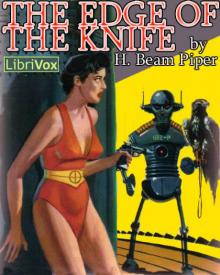 The Edge of the Knife
The Edge of the Knife Genesis
Genesis A Slave is a Slave
A Slave is a Slave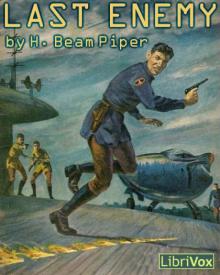 Last Enemy
Last Enemy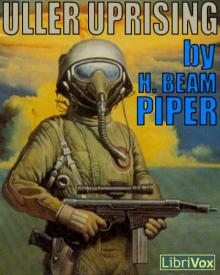 Uller Uprising
Uller Uprising Ministry of Disturbance
Ministry of Disturbance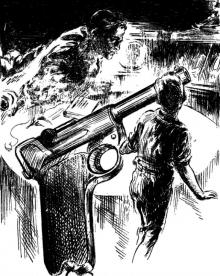 Time and Time Again
Time and Time Again The Mercenaries
The Mercenaries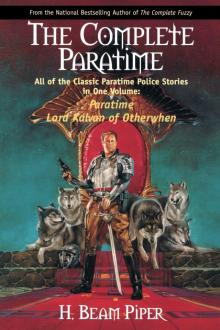 Police Operation
Police Operation He Walked Around the Horses
He Walked Around the Horses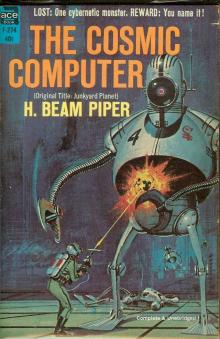 Time Crime
Time Crime Dearest
Dearest Day of the Moron
Day of the Moron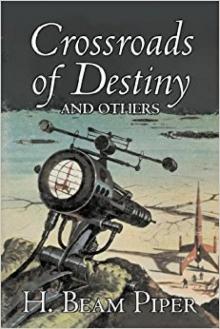 Crossroads of Destiny
Crossroads of Destiny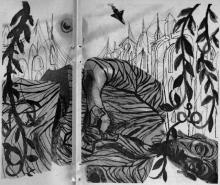 Graveyard of Dreams
Graveyard of Dreams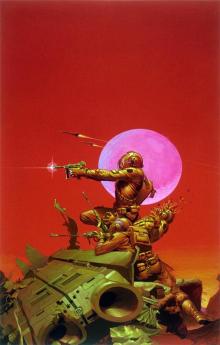 The Cosmic Computer
The Cosmic Computer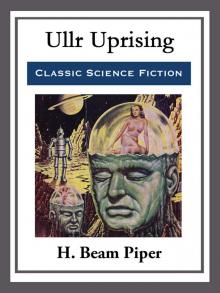 Ullr Uprising
Ullr Uprising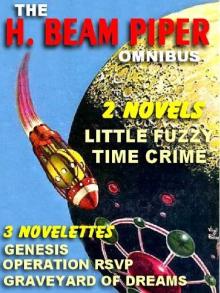 Operation R.S.V.P.
Operation R.S.V.P.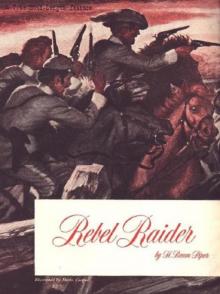 Rebel Raider
Rebel Raider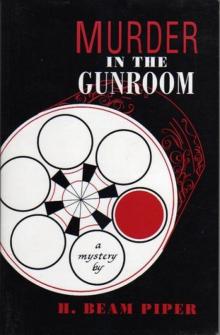 Murder in the Gunroom
Murder in the Gunroom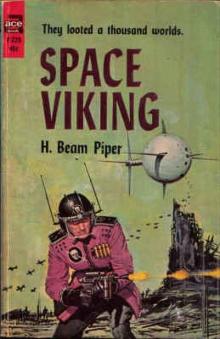 Space Viking
Space Viking The Answer
The Answer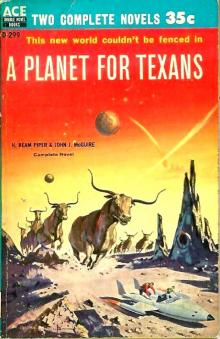 A Planet for Texans (aka Lone Star Planet)
A Planet for Texans (aka Lone Star Planet)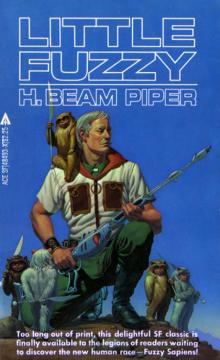 Little Fuzzy
Little Fuzzy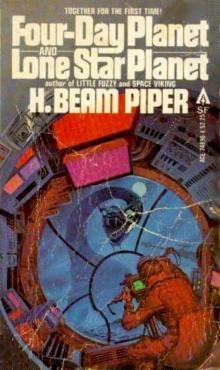 Four-Day Planet
Four-Day Planet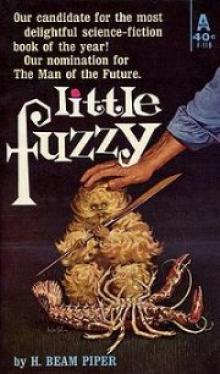 Little Fuzzy f-1
Little Fuzzy f-1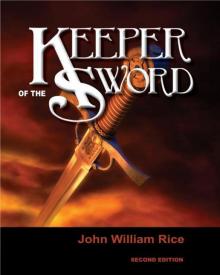 Keeper
Keeper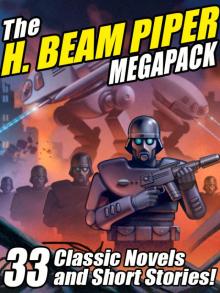 The H. Beam Piper Megapack
The H. Beam Piper Megapack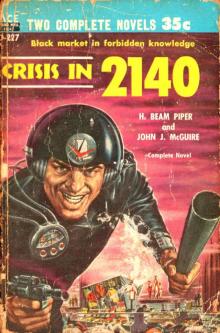 H. Beam Piper
H. Beam Piper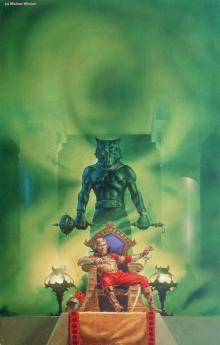 Lord Kalvan of Otherwhen
Lord Kalvan of Otherwhen Fuzzy Sapiens f-2
Fuzzy Sapiens f-2 Fuzzies and Other People f-3
Fuzzies and Other People f-3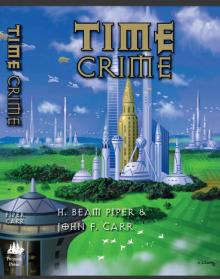 TIME PRIME
TIME PRIME Fuzzy Sapiens
Fuzzy Sapiens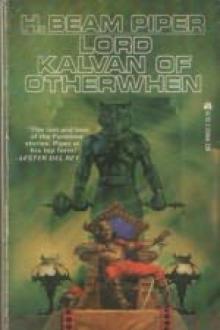 Lord Kalvan of Otherwhen k-1
Lord Kalvan of Otherwhen k-1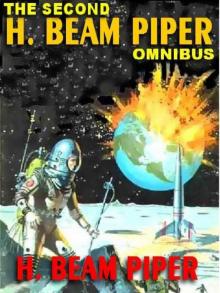 The Second H. Beam Piper Omnibus
The Second H. Beam Piper Omnibus